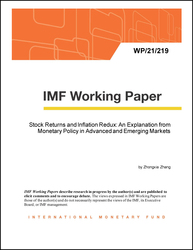
Stock Returns and Inflation Redux: An Explanation from Monetary Policy in Advanced and Emerging Markets
Stock Returns and Inflation Redux: An Explanation from Monetary Policy in Advanced and Emerging Markets
READ MORE...
Volume/Issue:
Volume 2021
Issue 219
Publication date: August 2021
ISBN: 9781513586755
$5.00
Add to Cart by clicking price of the language and format you'd like to purchase
Available Languages and Formats
| English |
Prices in red indicate formats that are not yet available but are forthcoming.
Topics covered in this book
This title contains information about the following subjects.
Click on a subject if you would like to see other titles with the same subjects.
Banks and Banking , Finance , Inflation , Economics- Macroeconomics , Money and Monetary Policy , Economics / General , monetary policy cyclicality , stock return-inflation relation , countercyclical monetary policy , market perception , inflation targeting country , Inflation , Stocks , Emerging and frontier financial markets , Inflation targeting , Central bank policy rate , Global
Summary
Classical theories of monetary economics predict that real stock returns are negatively correlated with inflation when monetary policy is countercyclical. Previous empirical studies mostly focus on a small group of developed countries or a few countries with hyperinflation. In this paper, I examine the stock return-inflation relation under different monetary policy regimes and conditions using an expanded dataset of 71 economies. Empirical evidence suggests that the stock return-inflation relation is partially driven by monetary policy. If a country’s monetary authority conducts a more countercyclical monetary policy, the stock return-inflation relation becomes more negative. In addition, the results differ by monetary policy framework. In exchange rate anchor countries, stock markets do not respond to monetary policy cyclicality. In inflation targeting countries, stock markets react more strongly to inflation. A key contribution of this paper is to classify inflation targeters by their behaviors, and illustrate that behavior matters in shaping market perceptions: markets react to inflation and monetary policy cyclicality when central banks are able to control inflation within their target bands. In this case markets are sensitive to inflation dynamics when inflation is above the announced target bands. Finally, when monetary policy is constrained by the Zero Lower Bound (ZLB), a structural break is introduced and real stock returns no longer respond to inflation and monetary policy cyclicality.
Copyright © 2010 - 2026
Powered by:
AIDC



